Yunnan Coffee output, Yunnan Coffee History what are the flavor characteristics of Yunnan small coffee beans
In recent years, Qianjie found that with the rise of domestic coffee culture, Yunnan coffee in China has gradually entered the circle of coffee lovers. Although the popularity of Yunnan coffee is far less than that of high-quality high-priced coffee such as Essex, Mantenin, Panama, etc., in terms of its high performance-to-price ratio, Qianjie thinks that it is also a good choice, so seven rations bean coffee have been set up in the front street. I hope that beginner friends can quickly get to know this producing area. Among them, in the producing area of Yunnan, China, Qianjie believes that the small-grain coffee in Baoshan, Yunnan is the most representative, which can make people realize the coffee flavor of Yunnan.
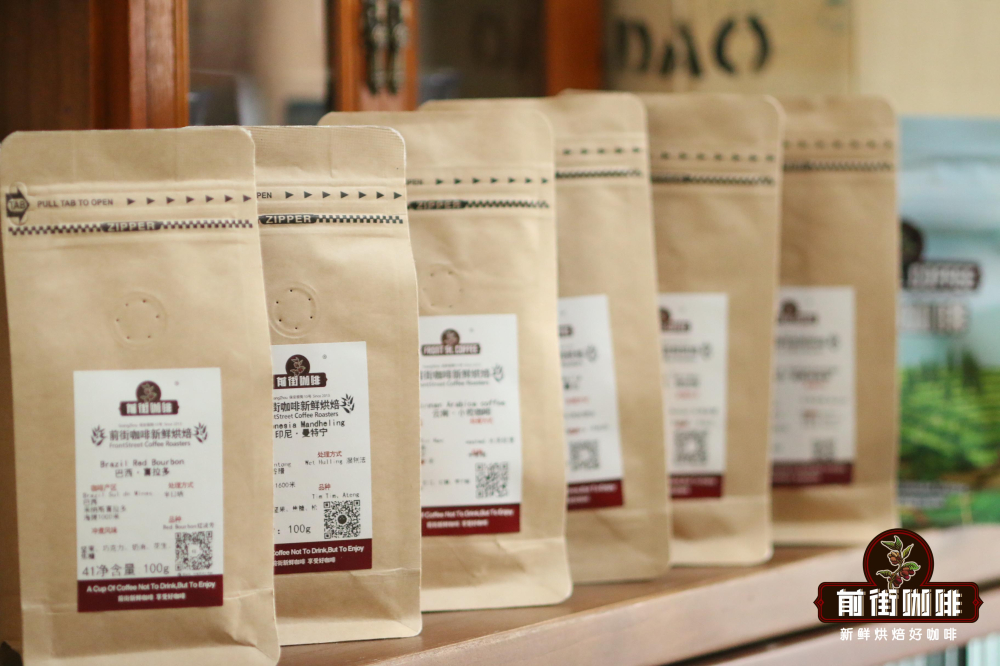
History of coffee in Yunnan
According to the relevant materials in Qianjie, a French missionary named Tian Deneng brought a batch of coffee seeds from Vietnam to Zhukula Village, Binchuan County, Dali City, Yunnan Province in 1902 and planted the first coffee tree. The coffee plants of this batch of coffee seeds are still blooming and fruiting in Binchuan County.
With the development of the country, in the spring of 1952, scientists and technicians of Yunnan Academy of Agricultural Sciences distributed 80kg coffee seeds to farmers in Lujiangba, Baoshan, and found that they had good adaptability and good quality. coffee cultivation in Yunnan has been growing ever since. Then, in 1988, Nestl é set up a joint venture in China, set up a coffee agronomic service department, cultivated coffee seeds suitable for local soil conditions and climate, and provided technical advice to local farmers to improve the yield and quality of coffee beans in Yunnan. And buy coffee beans at the price of the spot market in the United States at that time. This move has also led to the rise of Yunnan coffee.
Today, Yunnan coffee has developed into the largest coffee growing province in the country, accounting for more than 98% of the country's coffee output. From 2019 to 2021, the planting area of coffee in Yunnan is 1.57 million mu, 1.5 million mu and 139mu respectively, and the output of raw coffee beans is 145000 tons, 135100 tons and 140300 tons respectively, which shows that Yunnan plays an important role in the domestic coffee market. In addition to Nestl é, Starbucks, McDonnell's well-known coffee chain brands also set out to Yunnan coffee market.
Yunnan coffee producing area
The west and south of Yunnan Province are located in the tropical areas between 15 degrees north latitude and the Tropic of Cancer, most of which are 1000-2000m above sea level. The topography is dominated by mountains and slopes, and there are great ups and downs. Coupled with the fertile land, sufficient sunshine, rich rainfall and large temperature difference between day and night, the unique natural conditions have formed the particularity of Yunnan small grain coffee taste: strong but not bitter, fragrant but not strong, slightly fruity.
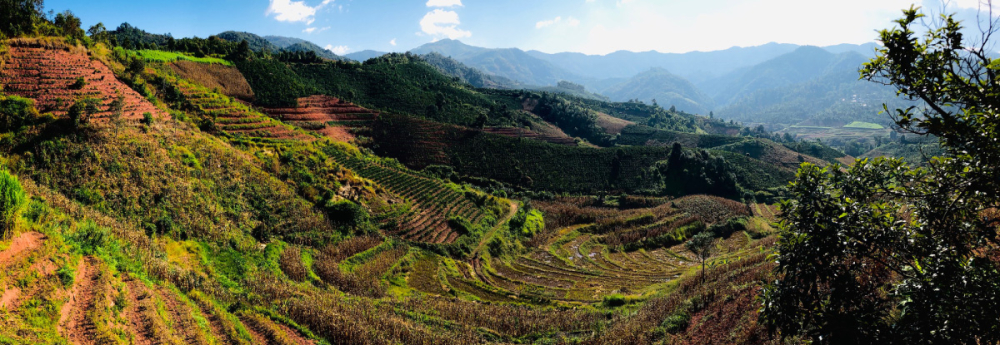
The coffee planting areas in Yunnan are mainly distributed in Baoshan, Pu'er, Dehong and Lincang, with the total planting area and total output exceeding 85% of the whole province. In addition, they are also the distribution areas of small-grain coffee varieties in Yunnan.
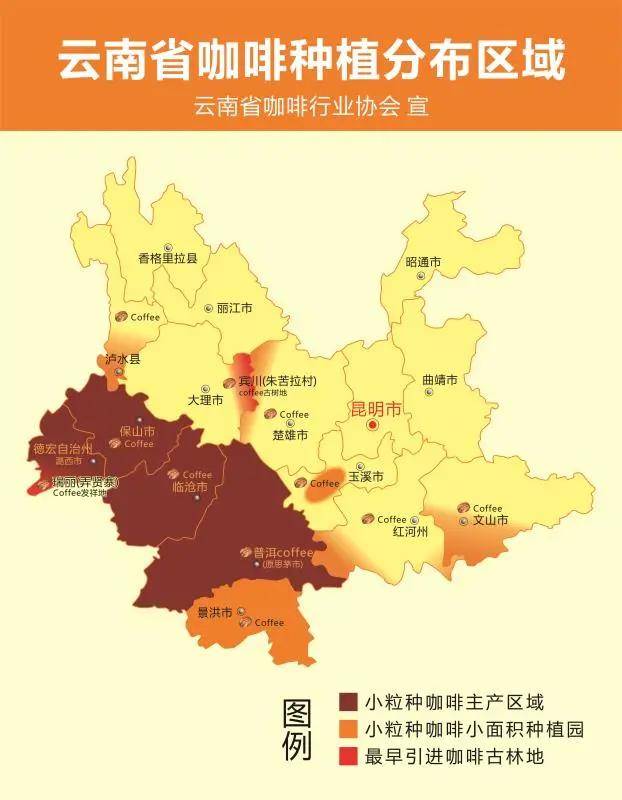
Dehong
The cotton planting experimental station of Luxi County, Dehong Prefecture first introduced coffee seeds from the border of China and Myanmar in 1951, implemented a coffee productive cultivation project on 6 mu of land, and began to plant coffee trees on a large scale. Therefore, Dehong has the title of "hometown of Coffee in China". Because of its unique natural conditions, Dehong is also one of the earliest areas in Yunnan Province to grow coffee. In addition, Dehong also has the largest coffee seed gene bank in China-Ruili Coffee Germplasm Resources Garden of the Ministry of Agriculture, which is one of the first nine tropical crop germplasm nurseries granted by the Ministry of Agriculture.
Baoshan
The cultivation of coffee in Baoshan began in the mid-1950s, and the first coffee seedling was introduced by the late patriotic overseas Chinese Mr. Liang Jinshan in Southeast Asia. Baoshan small-grain coffee was designated as a national geographical indication product by the General Administration of quality Supervision, Inspection and Quarantine in 2010.
The average temperature in Baoshan is about 21.3 degrees Celsius, with a maximum of 40.4 degrees Celsius. There is basically no Frosts Descent in the whole year, so it is recognized as the best producing area for growing small-grain coffee. With the expansion of international trade, Baoshan Lujiangba small-grain coffee is recognized by coffee experts at home and abroad. Baoshan small-grain coffee has been appraised as "strong but not bitter, fragrant but not strong, mellow, rich in oil, rich in acid, and long-lasting." this is the top grade of coffee. "
Lincang
Lincang, named after its proximity to the Lancang River, is located in the southwest of Yunnan and bordered by Myanmar in the west. The terrain here is complex, with an altitude of more than 1000 meters, and the annual average temperature is 17.3 degrees Celsius. There is no distinct four seasons of spring, summer, autumn and winter, but is divided into dry season and rainy season. June is the beginning of the rainy season every year, lasting 3-4 months, with a large temperature difference between day and night. Therefore, it is very suitable for the cultivation of coffee, a high-altitude tropical plant.
Therefore, Qianjie also took a fancy to the "treasure land" of Lincang, where it opened its own coffee farm to grow tin card varieties, and produced the first batch of self-produced Yunnan coffee beans in 2020, that is, the 2013 coffee beans in Qianjie.
Front Street Coffee: front Street 2013 Coffee beans
Producing area: Lincang, Yunnan
Manor: Qianjie Coffee Manor
Altitude: 1300 m
Variety: iron pickup
Treatment method: solarization treatment
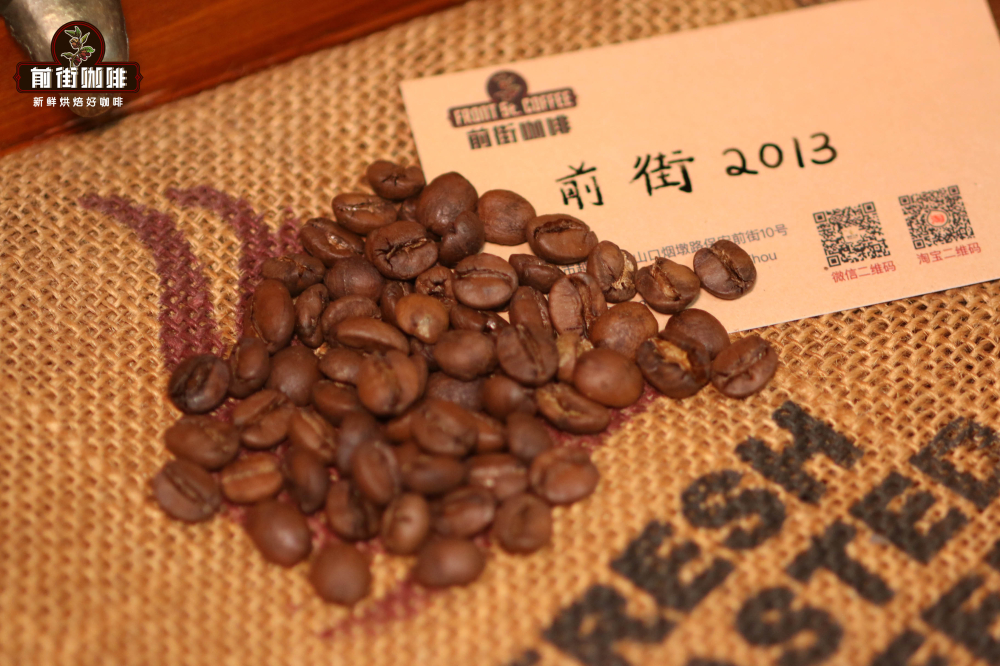
Small grain coffee variety
Qianjie Coffee believes that friends who have a preliminary understanding of coffee bean varieties must know Arabica varieties, and Arabica coffee beans are the smallest of the three major varieties (Arabica, Robusta, and Liberia). So the small-grain coffee we often talk about is Arabica. Yunnan coffee gets its name from the cultivation of iron pickup, which is also the oldest coffee variety in Yunnan, but it is unable to achieve mass production because of its weak disease resistance. So it began to plant other varieties with high yield and high disease resistance-Katim. S288, which is resistant to leaf rust, was introduced in Yunnan at the beginning, and later Katim, a hybrid of Tim and Kaddura, was introduced. Nowadays, most of the coffee trees planted in Yunnan are Katim species, and there are only a few tin card varieties.
Because Katim carries 1/4 Roberta gene, the fruit yield is larger, and it is easier to grow, so the initial performance in the cup test is relatively general, and the flavor is more monotonous, which is not as good as the pure aroma of the ancient variety tin pickup. However, in recent years, with the improvement of planting management and coffee raw bean processing technology, Yunnan Katim also has a good performance in the international coffee market, and the aroma of nuts, black tea and plum-like sweet and sour feeling are more and more popular. As a representative of Yunnan coffee flavor, Qianjie chose Katim in Baoshan, so that everyone can drink at the lowest price with the aroma of nuts, the sweetness of brown sugar, the soft acidity of plums, and finally the aftertaste of black tea. This bean is washed because Qianjie believes that washing can better show the flavor characteristics of Yunnan.
Qianjie Coffee: Yunnan small Coffee
Producing area: Baoshan, China
Altitude: 1200m
Variety: Katim
Treatment: washing treatment
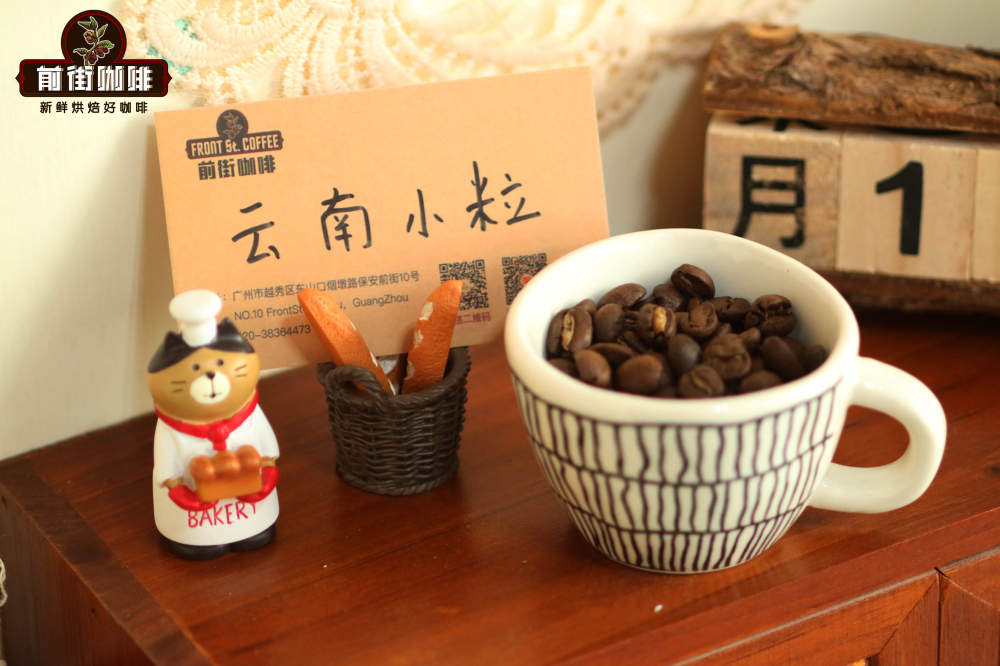
Cooking suggestion
So how do you make this small Yunnan coffee bean taste good? As the flavor of Yunnan coffee is not sour and nut-based, Qianjie coffee chooses medium roasting to retain the herbaceous aroma and soft acidity of Yunnan beans. In order to avoid excessive extraction, choose the water temperature of 91 degrees Celsius and use V60 to cook the filter cup.
Filter cup: V60
Water temperature: 91 degrees Celsius
Grinding degree: the screening rate of No. 20 standard screen is 80%.
Ratio of powder to water: 1:15
Amount of powder: 15g
Qianjie found that some friends do not have bean grinder equipment at home, it does not matter, Qianjie provides grinding service. As the aroma of coffee beans will be more easily distributed after grinding, and the taste period will be shortened, if you want to drink coffee with a better flavor, Qianjie still suggests that you can be equipped with grinding tools and grind them now. The taste period refers to the best time for coffee to show its flavor after 3-7 days of exhaust after roasting, and then will be lost over time. The best taste period is usually 4-30 days after baking. Coffee beans sold on Qianjie are usually freshly roasted within 5 days and are basically within the best taste period when received. )
Pour the ground coffee powder into the filter cup, then you can smell the aroma of bean herbs and nuts, first stew with 30g water for 30s, then inject 95g water in a circle from the center, pay attention to the fine water flow throughout the process, wait until the powder bed falls to half of the filter cup, continue to inject 100g water around the circle, until the coffee liquid is filtered, about 2 minutes (error 10s).
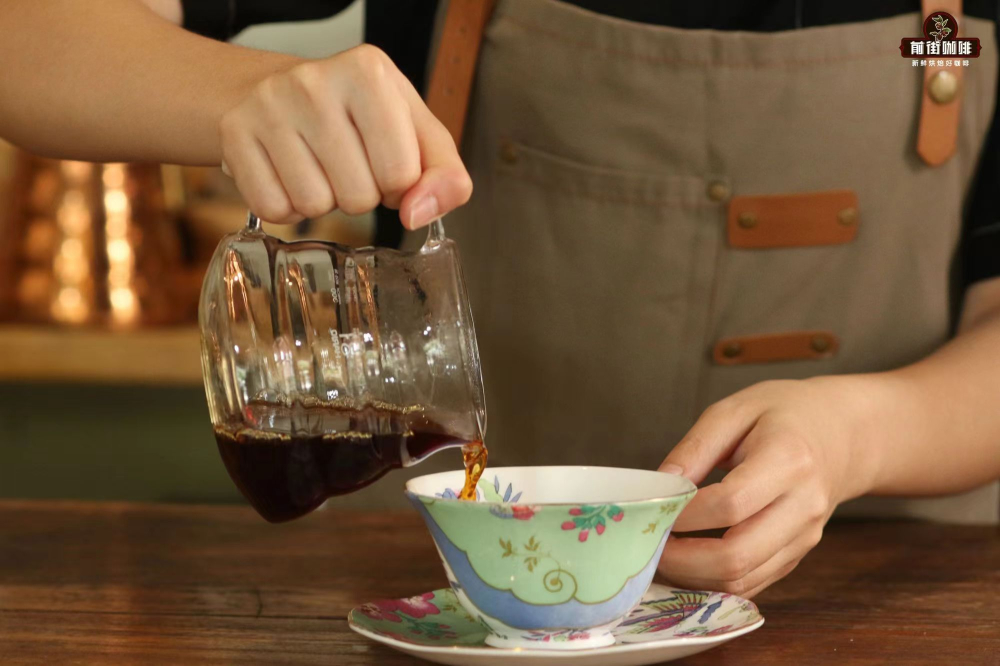
After Yunnan small grain beans are boiled, the entrance is the sweetness of nuts and brown sugar, the acidity of plums can be drunk as the temperature drops, and the aftertaste of black tea is soft as a whole.
Professional coffee knowledge exchange more coffee bean information please follow the coffee workshop (Wechat official account cafe_style)
For more boutique coffee beans, please add private Qianjie coffee on Wechat. WeChat account: qjcoffeex
Important Notice :
前街咖啡 FrontStreet Coffee has moved to new addredd:
FrontStreet Coffee Address: 315,Donghua East Road,GuangZhou
Tel:020 38364473
- Prev

Positioning of Yunnan Coffee and Coffee planting in Yunnan
Following Cafe Review (Wechat official account vdailycom) found that it is really not good quality for Beautiful Cafe to open its own shop? Yunnan's soil and water climate is very suitable for coffee growth, but the quality of Yunnan coffee has always been good. Andy, founder of Yunnan Weisheng Coffee Co., Ltd., founder of Yunnan Coffee exporters Association, believes that the planting management of Yunnan coffee is very extensive.
- Next

Yunnan Coffee introduction, do you know Yunnan Coffee overseas?
Following Cafe Review (Wechat official account vdailycom) found that Coffee Cafe opened a small shop of its own. Coffee is a beverage crop with high economic value. It is regarded as the three largest beverages in the world along with cocoa and tea, and its output and consumption rank first among the three beverages. Coffee is rich in protein, fat, sucrose, starch, glucose, caffeine and other substances.
Related
- Detailed explanation of Jadeite planting Land in Panamanian Jadeite Manor introduction to the grading system of Jadeite competitive bidding, Red bid, Green bid and Rose Summer
- Story of Coffee planting in Brenka region of Costa Rica Stonehenge Manor anaerobic heavy honey treatment of flavor mouth
- What's on the barrel of Blue Mountain Coffee beans?
- Can American coffee also pull flowers? How to use hot American style to pull out a good-looking pattern?
- Can you make a cold extract with coffee beans? What is the right proportion for cold-extracted coffee formula?
- Indonesian PWN Gold Mandrine Coffee Origin Features Flavor How to Chong? Mandolin coffee is American.
- A brief introduction to the flavor characteristics of Brazilian yellow bourbon coffee beans
- What is the effect of different water quality on the flavor of cold-extracted coffee? What kind of water is best for brewing coffee?
- Why do you think of Rose Summer whenever you mention Panamanian coffee?
- Introduction to the characteristics of authentic blue mountain coffee bean producing areas? What is the CIB Coffee Authority in Jamaica?

